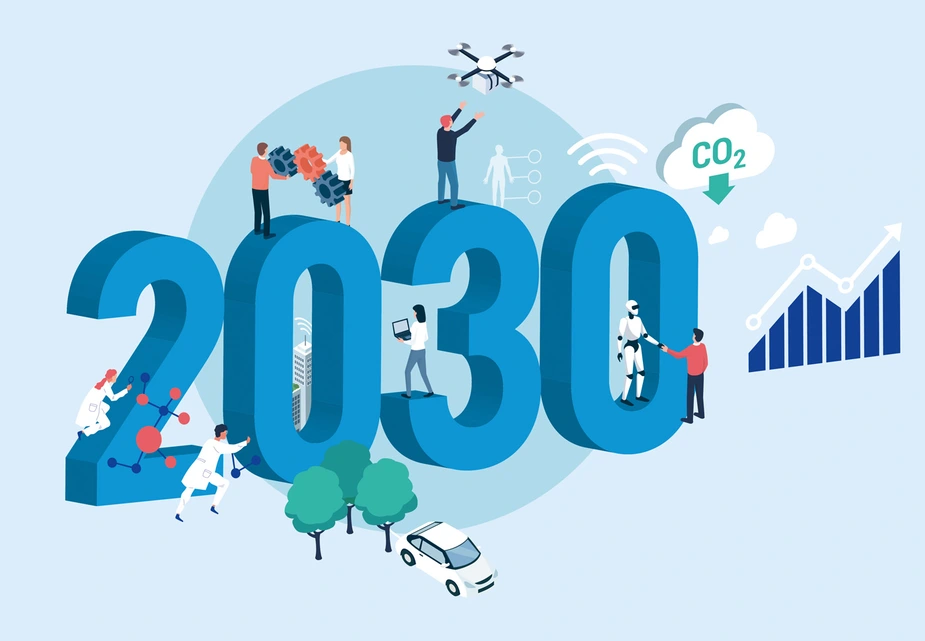Mission 2030
How do we keep the Technology Park Adlershof on a road to success?
Things are going smoothly in Adlershof. To make sure this continues, WISTA Management GmbH is thinking about ways to keep the site on a road to success – and to make it even better.
It is seldom good to rest on one’s laurels. Adlershof is now a strong location, but it is also prudent to think about its weaknesses. The Science and Technology Park is flourishing, but is there anything we could do to make it better? It is time to look more closely at the site’s conditions and to draw up a strategy concept as to how it should develop until 2030. The site’s managers have been debating these issues at great length. They also commissioned Borderstep Institute to draw up a study, sketching out strengths and weaknesses, chances and risks, and to create some input for a sustainable future strategy. To this end, Borderstep Institute surveyed various stakeholders of the Science City in Adlershof.
The study praises the location’s political support, the quick and flexible real estate development, the existing space for growth, and its clear-cut thematic focus on photonics and optics, which have contributed to Adlershof’s excellent reputation. However, some respondents expressed that ‘a development strategy regarding technologies and themes is not sufficiently visible,’ the site’s profile ‘is not clearly communicated at a national and international level,’ and that it is not strongly associated with well-known companies. Furthermore, a well-established infrastructure for large conferences is an important factor contributing to a sustainable future. Adlershof could become much more than a flagship for Berlin. As a ‘site with an international reputation,’ it could join the international ‘champions league,’ especially with its access to new talent from several universities.
A key factor on this road is to continue to attract future-facing companies. Above all, it is important to contribute to responding to our time’s most pressing challenges (the ‘Grand Challenges’), which include sustainability, climate change, and energy. The activities of other science and technology parks and current trends in research policy clearly indicate an increasing relevance of issues like energy, the climate, the environment, and sustainability.
To make the site fit for 2030, the study’s authors propose setting up an interdisciplinary competence centre for ‘Grand Challenges solutions’ in addition to the existing technology centres. Moreover, they suggest that Adlershof establishes a centre for increasing international visibility by creating liaison offices, attracting international workshops and conferences, and developing a network of ‘ambassadors’, much like the Free University’s ‘Centre for International Cooperation.’ The latter also facilitates attracting international top-level talent to the site.
The study goes on by suggesting that Adlershof should introduce innovation and transfer managers for each of its technology fields. It also recommends seeking out a renowned person and establishing it as a ‘scientific figurehead’ to represent the site’s brand at an international level. Berlin’s significance as a city of science and research should also be highlighted more.
Meanwhile, the board of Berlin’s Humboldt-Universität proposed to bring together all Adlershof’s business incubation centres under one roof, at least administratively. This could create synergies and contribute to tying in more stakeholders into the site’s business founding and knowledge transfer activities. Despite the fact that many of the study’s respondents hailed Adlershof’s business support activities as exemplary and as a distinct strength of the site, it recommended to increase support for growth-oriented start-ups and fast-growing young companies (‘gazelles’) to foster the growth of global high performers.
Lastly, the study’s authors pose five strategic questions towards creating a vision for 2030: What are the site’s goals? How does Adlershof see its role in Berlin as a hub for science and research? How relevant are the Grand Challenges? How can coordination between science and policy be improved? How does Adlershof deal with its space for growth? These are questions that concern everyone working on the site and everyone can contribute to. WISTA’s management is looking forward to all ideas and contributions!
By Chris Löwer for Adlershof Journal
